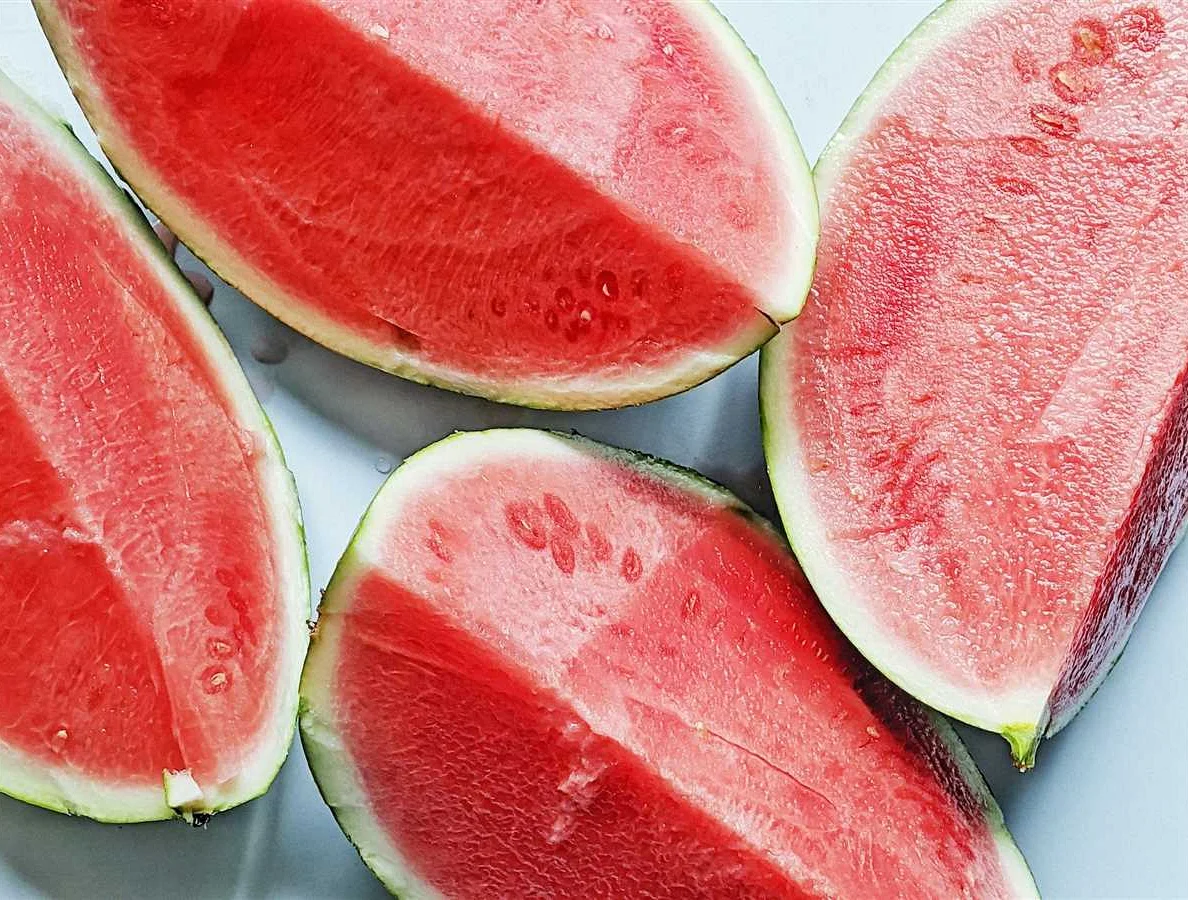How Much Watermelon Can You Eat Per Day Without Harming Your Health?
Содержимое
Discover how much watermelon you can safely consume each day to enjoy its health benefits without any negative effects on your well-being. Learn about the recommended serving size of watermelon and its potential risks if consumed in excess.
Watermelon is a refreshing fruit that is loved by many and is especially popular during the summer months. Its juicy, sweet flesh is not only delicious, but it also provides numerous health benefits. However, like all fruits, it is important to consume watermelon in moderation.
So, how much watermelon can you safely eat each day? The answer depends on several factors, including your overall health, diet, and activity level. In general, it is recommended to consume about 2 cups of watermelon per day. This amount provides a good balance of vitamins, minerals, and hydration without overloading your system with excessive sugar.
Watermelon is naturally low in calories and fat, making it a great choice for those looking to maintain a healthy weight. It is also rich in vitamins A and C, as well as antioxidants that help protect your cells from damage. Furthermore, watermelon has a high water content, which can help keep you hydrated and support proper digestion.
However, if you have any underlying health conditions such as diabetes or kidney problems, it is essential to consult with your healthcare provider before increasing your watermelon intake. This is because watermelon contains natural sugars that can affect blood sugar levels, and it also has a high potassium content, which may be problematic for individuals with kidney issues.
In conclusion, watermelon is a delicious and nutritious fruit that can be enjoyed as part of a healthy diet. However, it is important to consume it in moderation and consider your personal health circumstances. By doing so, you can safely enjoy the many benefits that watermelon has to offer.
Benefits of Eating Watermelon

Watermelon is not only delicious, but it also offers numerous health benefits. Here are some of the advantages of including watermelon in your diet:
1. Hydration: With its high water content, watermelon is an excellent fruit to consume to stay hydrated. It can help replenish fluids in the body, especially during hot summer months.
2. Nutrient-rich: Watermelon is packed with essential vitamins and minerals, such as vitamin C, vitamin A, potassium, and magnesium. These nutrients are crucial for maintaining overall health and well-being.
3. Antioxidant properties: Watermelon contains antioxidants, such as lycopene and vitamin C, which help protect the body against free radicals. These free radicals can cause oxidative stress and contribute to various diseases.
4. Heart health: The lycopene found in watermelon has been linked to improving heart health. It can help lower blood pressure and reduce the risk of heart disease.
5. Weight management: Watermelon is low in calories and high in water content, making it a great option for those trying to manage their weight. It can help keep you feeling full without adding excessive calories to your diet.
6. Digestive health: Watermelon is a good source of fiber, which is essential for maintaining a healthy digestive system. It can aid in preventing constipation and promoting regular bowel movements.
7. Skin health: The high water content in watermelon helps keep the skin hydrated and moisturized. It also contains vitamins A and C, which are beneficial for promoting healthy skin and preventing signs of aging.
8. Eye health: Watermelon is rich in beta-carotene, which the body converts to vitamin A. This vitamin is essential for maintaining good vision and promoting eye health.
Overall, including watermelon in your diet can provide numerous benefits for your health and well-being. However, it is important to consume it in moderation as part of a balanced diet.
Hydrates Your Body
Watermelon is composed of about 92% water, making it an excellent choice for hydration. Consuming watermelon can help replenish the fluids in your body, especially during hot summer months or after intense physical activity.
Staying hydrated is important for maintaining various bodily functions, such as regulating body temperature, lubricating joints, and aiding digestion. By including watermelon in your diet, you can ensure that your body stays properly hydrated.
Provides Essential Nutrients
Watermelon is a nutritious fruit that is packed with essential vitamins and minerals. It is a great source of vitamin C, which is important for maintaining a healthy immune system and skin. Additionally, watermelon contains vitamins A and B6, both of which play a crucial role in supporting overall health and vitality.
In addition to vitamins, watermelon is also rich in minerals such as potassium and magnesium. Potassium is an electrolyte that helps regulate fluid balance, nerve function, and muscle contractions. Magnesium, on the other hand, is involved in numerous biochemical reactions in the body, including energy production and DNA synthesis.
Watermelon also contains antioxidants like lycopene, which gives the fruit its vibrant red color. Lycopene has been linked to numerous health benefits, including a reduced risk of heart disease and certain types of cancer.
Furthermore, watermelon is a hydrating food due to its high water content. Staying hydrated is essential for overall health and can help regulate body temperature, promote digestion, and support cognitive function.
Overall, incorporating watermelon into your diet can provide you with a wide range of essential nutrients that support your overall health and well-being.
Boosts Immune System

Watermelon is packed with vitamins and minerals that can help boost your immune system. It is a rich source of vitamin C, which is known to enhance the function of immune cells and protect against infections. Vitamin C also acts as an antioxidant, helping to reduce oxidative stress in the body and support overall immune health.
In addition to vitamin C, watermelon contains other immune-boosting nutrients such as vitamin A and antioxidants like lycopene. Vitamin A plays a crucial role in maintaining the health of your skin and mucous membranes, which act as a barrier against pathogens. Lycopene, on the other hand, has been shown to have anti-inflammatory and antioxidant properties that can help strengthen the immune system and reduce the risk of chronic diseases.
By including watermelon in your diet, you can provide your body with these essential nutrients that support a strong immune system. However, it’s important to note that watermelon should be consumed as part of a balanced diet and not as a sole remedy for immune health. Incorporating a variety of fruits, vegetables, and other immune-boosting foods into your daily meals is key to maintaining a strong and resilient immune system.
Promotes Heart Health
Watermelon is rich in several heart-healthy nutrients that can help protect your cardiovascular system.
- Lycopene: Watermelon is an excellent source of lycopene, a powerful antioxidant that has been linked to a reduced risk of heart disease. Lycopene helps lower levels of “bad” LDL cholesterol and prevents the oxidation of LDL cholesterol, which can lead to plaque buildup in the arteries.
- Potassium: Watermelon is also high in potassium, which is essential for maintaining a healthy heart. Potassium helps regulate blood pressure by counteracting the effects of sodium and relaxing the blood vessel walls.
- Citrulline: Watermelon contains citrulline, an amino acid that converts to arginine in the body. Arginine is involved in the production of nitric oxide, which helps blood vessels relax and improves blood flow. This can reduce the risk of high blood pressure and improve overall heart health.
Incorporating watermelon into your diet can help promote heart health and reduce the risk of cardiovascular diseases. However, it’s important to consume it in moderation as part of a balanced diet to avoid excessive sugar intake.
Helps with Weight Loss
Watermelon is a great choice for those looking to lose weight. It is low in calories and high in water content, which can help you feel fuller for longer periods of time. The high water content also means that watermelon has a low energy density, making it a great snack option for those watching their calorie intake.
Watermelon is also a good source of fiber, which can aid in weight loss. Fiber helps to keep you full and satisfied, reducing the likelihood of overeating. Additionally, the natural sugars found in watermelon are easily digestible and provide a quick source of energy, making it a great choice for pre-workout fuel.
Furthermore, watermelon is rich in vitamins and minerals, including vitamin C and potassium. These nutrients are essential for overall health and can support your weight loss efforts by boosting your immune system and promoting muscle recovery and growth.
However, it is important to note that while watermelon can be beneficial for weight loss, it should be consumed as part of a balanced diet. It is still important to incorporate a variety of fruits, vegetables, lean proteins, and whole grains into your meals to ensure you are getting all the necessary nutrients your body needs.
In conclusion, watermelon is a refreshing and nutritious fruit that can aid in weight loss when consumed in moderation as part of a healthy eating plan. Its high water content, fiber content, and nutrient profile make it a satisfying and beneficial option for those looking to shed pounds.
Enhances Digestive Health

Watermelon is a hydrating fruit that contains a high amount of water and fiber, making it a perfect choice for improving digestive health. The water content in watermelon helps to keep the digestive system hydrated, preventing constipation and promoting regular bowel movements.
The fiber content in watermelon also aids in digestion. Fiber acts as a natural laxative, adding bulk to the stool and promoting regular bowel movements. It also helps to prevent digestive issues like bloating, gas, and indigestion.
Additionally, the presence of certain enzymes in watermelon, such as bromelain, helps to break down proteins and improve digestion. This can be beneficial for individuals with digestive disorders or those who struggle with protein digestion.
Overall, incorporating watermelon into your diet can help enhance your digestive health and promote a healthy digestive system.